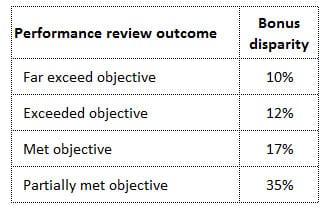
Not only are women paid less, promoted less and accumulate less superannuation than men, they are also given lower performance bonuses, despite performance reviews showing they are doing as good or better in their roles.
A new report by Mercer provided Australia’s first in-depth analysis of incentives and variable rewards an at the gender disparity in performance bonuses. It confirmed what many Australian women probably already knew – their efforts are not rewarded to the same level as men’s.
Mercer tabulated performance reviews and bonuses paid, they found a difference of up to 35% for the same outcome. Interestingly, the gap grows as the performance of the employees decreases.
Just to be clear, yes, that means that when a man and a woman are given a performance review that says they both far exceeded the objective, men were given bonuses that were, on average, 10% higher than women’s bonuses.
Garry Adams, leader of Mercer’s Talent Business in the Pacific who produced this report, said:
Our report provides hard evidence of why pay equity cannot be simply viewed through the lens of fixed pay
This is not just talking about the top 1%. Sales jobs, project workers, recruitments workers even retail workers can all work under structured incentive arrangements, where bonuses are tied to performance reviews.
For all those roles, and many others, not only are men rewarded more for the same work, they are also penalised less for failing to meet expectations. This ties in perfectly to Jennie Hill’s article yesterday:
…on ABC’s “The Drum” just after Michelle’s win yesterday, fellow woman jockey Casey Bruce was asked why there are so few women jockeys at the top. She claimed women jockeys who make a mistake on a horse are quickly replaced by a man, on the basis that (of course) women jockeys just don’t cut the mustard. Yet a male jockey making a mistake is just a person making a mistake, and future decisions about his ability will be made on the basis of all evidence about him without any consideration of the relevance of his gender.
This means the personal pressures on men are lower, as they’re able to perform as individuals and have the comfort of knowing they’ll be judged purely on merit. They’ll be given second (and third, and maybe fourth) chances, which will increase their competence, because competence comes partly from learning through mistakes. If women are sacked after their first or second mistake, how will they ever become champions?
She was talking about sport, but the concept is relevant to any industry. Unconscious bias affects the way women’s successes and failures are viewed in their chosen profession.
This report from Mercer is proof that this bias exists and has a tangible effect on women’s remuneration.
Garry Adams had this to say about the results of the report:
It is evident that there is a significant opportunity for organisations to review how variable rewards and incentive pay is distributed to employees. This involved organisations being aware if unconscious bias exists, and taking the first step to acknowledge this and develop a more equitable talent strategy that reward performance regardless of gender.
Well, yes.
It’s unlikely that the people making performance pay decisions are deliberately and consciously paying men more. It’s not at all uncommon for CEOs to assume there is no pay gap in their company, audit results often come as quite a shock. But this just proves yet again that audits are necessary, that keeping pay details secret contributes to the gender disparity problem
As Adams says, there are no quick or easy fixes for the gender pay gap, but the first and most basic step has to be understanding the full extent of the problem.



